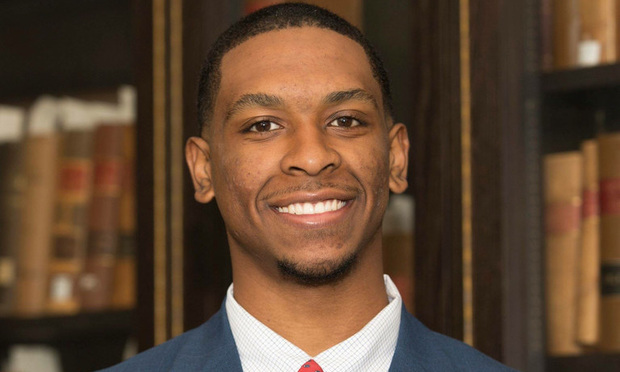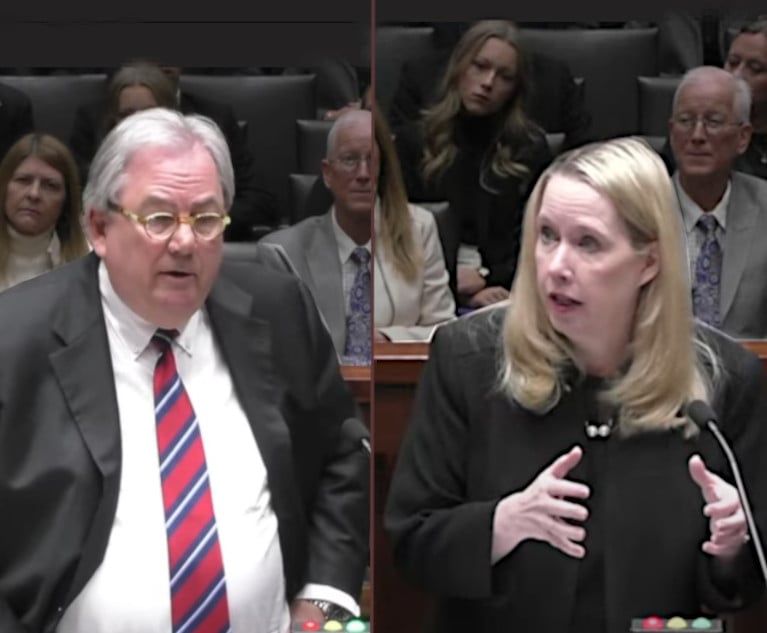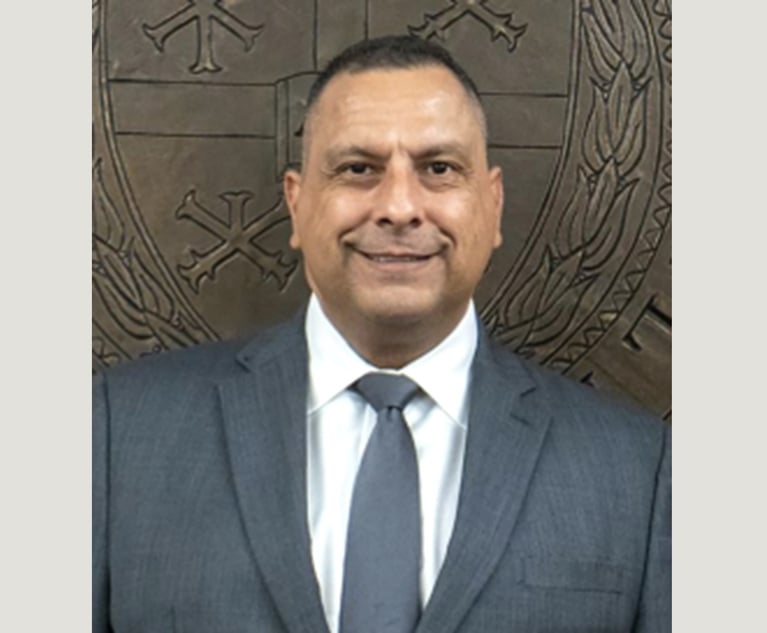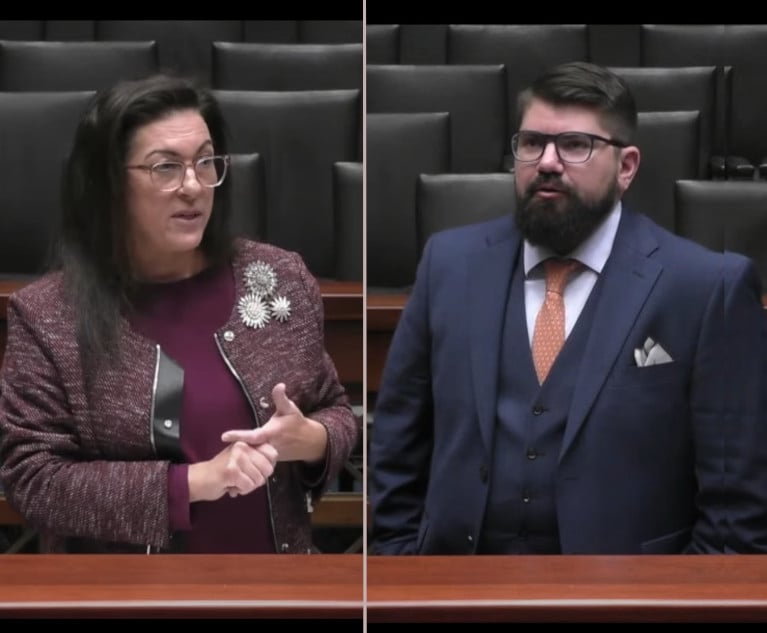Entering Its Fourth Year, the Award-Winning University of Houston's Pre-Law Center Is Just Getting Started
Now in its fourth year, Houston's Pre-Law Pipeline Program on May 30 begins eight weeks of courses for first-generation, low-income and underrepresented minority students. Some will explore whether a legal career is right for them, and others will seek focused help to bolster their law school applications and Law School Admission Test scores.
May 01, 2018 at 06:00 AM
7 minute read
 University of Houston undergraduate student Daniel Henry.
University of Houston undergraduate student Daniel Henry.
Daniel Henry was studying to become an engineer, but something wasn't right.
Studying for his undergraduate engineering courses at the University of Houston was boring—a real chore—and he couldn't see himself in the field for the rest of his life. Then an African-American studies course made him realize his true passion was fighting for justice and helping the black community.
But how?
That question lead him to enroll in an innovative, intense diversity program at the University of Houston Law Center, unprecedented among Texas law schools and rare among nationwide law schools, which has won national accolades from diversity advocates.
“I just went to learn about the legal field, and I came out knowing [and] fighting for justice as an attorney was my purpose,” Henry said.
Now in its fourth year, Houston's Pre-Law Pipeline Program on May 30 begins eight weeks of courses for first-generation, low-income and underrepresented minority students. Some will explore whether a legal career is right for them, and others will seek focused help to bolster their law school applications and Law School Admission Test scores.
Henry isn't the only one who's found his passion for the law through the pipeline program.
Among the 86 students who went through the program over the past three summers, 58 are still working to complete their undergraduate degrees. As for those who are done or nearly done with undergrad, 18 have chosen to become lawyers: 11 are currently enrolled, and seven have been accepted. Another four have enrolled in graduate schools, and it's unknown what six students have chosen.
Among the 18 students planning to become lawyers, three students enrolled in Houston, and two more are starting there this fall. Other students have gone to schools spread around the country, such as Brooklyn Law School, George Washington University Law School, Howard University School of Law, Oklahoma City University School of Law , the University of Miami School of Law and the University of Oklahoma College of Law.
Houston Law Dean Leonard Baynes, who created the program, said its results are remarkable. He noted that although he wants as many pipeline students as possible to come to Houston, that's not the point of the program, nor his primary desire for the students.
“It's our responsibility to the profession, to make sure it has a wide swath of people,” he explained. “The most important thing is that they go to law school. I don't care where they want to go to law school—I just want them to pursue their dreams, and achieve their dreams.”
Houston's prelaw pipeline program is unprecedented among Texas law schools, although a smattering of law schools across the nation do offer similar programs. According to discoverlaw.org, Prelaw Undergraduate Scholars programs also exist at eight other law schools in California, New York, Ohio, Alabama, North Carolina, Maine, Wisconsin and Missouri.
However, Houston's program has won national accolades. INSIGHT Into Diversity magazine, which covers diversity and inclusion in higher education, recognized Houston two years in a row with its Higher Education Excellence in Diversity Award, which recognizes initiatives that embrace all aspects of diversity.
“It's one of the most intensive programs nationwide,” Baynes said of Houston's prelaw pipeline program.
To launch the program in the beginning, Houston Provost Paula Short provided $525,500 in funding for the program's 2015 and 2016 operations, according to Houston spokeswoman Carrie Criado. Also in 2016, the program received a $125,000 diversity pipeline grant from the AccessLex Institute, a nonprofit that provides student loans for underrepresented law students. The Law School Admission Council has also provided grants of $100,000 each year for 2018, 2019 and 2020.
Kristen Guiseppi, prelaw pipeline program manager, puts a lot of energy into recruiting pipeline students. She relies heavily on social media and email campaigns to get the word out, frequently contacts prelaw advisers across the nation, and also travels to undergraduate colleges and universities to recruit students directly.
She said that 49 percent of her students are black, and 34 percent are Hispanic. Seventy percent of the students come from Texas, and the rest come from all over the United States—New York, Georgia, Iowa, Miami, Oklahoma and more.
Students live on campus during the program, to make sure they're fully immersed in the law school world and focused on the program. The program is separated out into two tracks.
Students in the first track can get free tuition and room and board and a $1,000 stipend. The track teaches students about law school, allows them to network with attorneys, and requires them to take law school courses taught by Houston Law professors. There's also a three-week legal internship at legal employers like Bracewell, Greenberg Traurig, Lone Star Legal Aid, the Harris County District Attorney's Office and more.
The second track, open to undergraduate seniors, has a laser focus to help students prepare their law school applications: They craft resumes, personal statements or diversity statements and study for the LSAT for the entire eight-week program. Unlike the first track, second-track students must pay $2,500 for tuition, materials and room and board. There are scholarships and financial aid to help students pay.
Henry, the former engineering student, acted on his epiphany that a legal career was his destiny. After doing the first track of the pipeline program, he changed his major and started community service with an African-American community center that eventually hired him because he was volunteering so much.
The next summer, in 2017, he returned to the pipeline program for the second track. His LSAT score increased by 10 points, making him eligible for his top-choice law school. Henry, who wants to practice criminal justice law as either a defense lawyer or prosecutor, has already been accepted into that school, although he declined to name the school until he makes his attendance there official.
Henry's improved LSAT score is par for the course for pipeline students. Guiseppi said the median class increase is 11 points, although some students have increased their score as much as 17 points.
“What that does for our students is it takes them from potentially an LSAT score where they may not even be accepted to law school, to a point where they now have different law school options and they are eligible for scholarships,” she said.
Natalie Diala is one of the students who has already enrolled in law school—she chose Houston—after participating in the second track of the pipeline program. She found great success, making the dean's list for her first year of law school.
Diala said the pipeline program was instrumental in honing her abilities and continues to benefit her, even now. She gained an important mentor, already knew a lot of law professors, and even had formed relationships with the law school's dean and assistant deans. These connections have helped to hook up Diala with law students on law review, a law firm where she plans to work this summer, and more.
She said it's been important to her to be part of a major diversity initiative like the pipeline program.
“Being a law student, there aren't too many people who look like me in my classes. I'm not saying everyone who looks like me has the same opinion, but having that diversity of thought is important. It's something you may not be able to hear, if you all come from the same background,” said Diala. “Not all your clients and people you represent will think just like you and have the same opinion or background you have.”
Angela Morris is a freelance journalist. Follow her on Twitter at @AMorrisReports
This content has been archived. It is available through our partners, LexisNexis® and Bloomberg Law.
To view this content, please continue to their sites.
Not a Lexis Subscriber?
Subscribe Now
Not a Bloomberg Law Subscriber?
Subscribe Now
NOT FOR REPRINT
© 2025 ALM Global, LLC, All Rights Reserved. Request academic re-use from www.copyright.com. All other uses, submit a request to [email protected]. For more information visit Asset & Logo Licensing.
You Might Like
View All
Case With 'Serious Consequences for Corporate Law' Heads to Texas Supreme Court
5 minute read

How Uncertainty in College Athletics Compensation Could Drive Lawsuits in 2025

'It's Like They Lynched You:' Law Professor's Discrimination Claim Reaches High Court
7 minute readTrending Stories
Who Got The Work
J. Brugh Lower of Gibbons has entered an appearance for industrial equipment supplier Devco Corporation in a pending trademark infringement lawsuit. The suit, accusing the defendant of selling knock-off Graco products, was filed Dec. 18 in New Jersey District Court by Rivkin Radler on behalf of Graco Inc. and Graco Minnesota. The case, assigned to U.S. District Judge Zahid N. Quraishi, is 3:24-cv-11294, Graco Inc. et al v. Devco Corporation.
Who Got The Work
Rebecca Maller-Stein and Kent A. Yalowitz of Arnold & Porter Kaye Scholer have entered their appearances for Hanaco Venture Capital and its executives, Lior Prosor and David Frankel, in a pending securities lawsuit. The action, filed on Dec. 24 in New York Southern District Court by Zell, Aron & Co. on behalf of Goldeneye Advisors, accuses the defendants of negligently and fraudulently managing the plaintiff's $1 million investment. The case, assigned to U.S. District Judge Vernon S. Broderick, is 1:24-cv-09918, Goldeneye Advisors, LLC v. Hanaco Venture Capital, Ltd. et al.
Who Got The Work
Attorneys from A&O Shearman has stepped in as defense counsel for Toronto-Dominion Bank and other defendants in a pending securities class action. The suit, filed Dec. 11 in New York Southern District Court by Bleichmar Fonti & Auld, accuses the defendants of concealing the bank's 'pervasive' deficiencies in regards to its compliance with the Bank Secrecy Act and the quality of its anti-money laundering controls. The case, assigned to U.S. District Judge Arun Subramanian, is 1:24-cv-09445, Gonzalez v. The Toronto-Dominion Bank et al.
Who Got The Work
Crown Castle International, a Pennsylvania company providing shared communications infrastructure, has turned to Luke D. Wolf of Gordon Rees Scully Mansukhani to fend off a pending breach-of-contract lawsuit. The court action, filed Nov. 25 in Michigan Eastern District Court by Hooper Hathaway PC on behalf of The Town Residences LLC, accuses Crown Castle of failing to transfer approximately $30,000 in utility payments from T-Mobile in breach of a roof-top lease and assignment agreement. The case, assigned to U.S. District Judge Susan K. Declercq, is 2:24-cv-13131, The Town Residences LLC v. T-Mobile US, Inc. et al.
Who Got The Work
Wilfred P. Coronato and Daniel M. Schwartz of McCarter & English have stepped in as defense counsel to Electrolux Home Products Inc. in a pending product liability lawsuit. The court action, filed Nov. 26 in New York Eastern District Court by Poulos Lopiccolo PC and Nagel Rice LLP on behalf of David Stern, alleges that the defendant's refrigerators’ drawers and shelving repeatedly break and fall apart within months after purchase. The case, assigned to U.S. District Judge Joan M. Azrack, is 2:24-cv-08204, Stern v. Electrolux Home Products, Inc.
Featured Firms
Law Offices of Gary Martin Hays & Associates, P.C.
(470) 294-1674
Law Offices of Mark E. Salomone
(857) 444-6468
Smith & Hassler
(713) 739-1250






